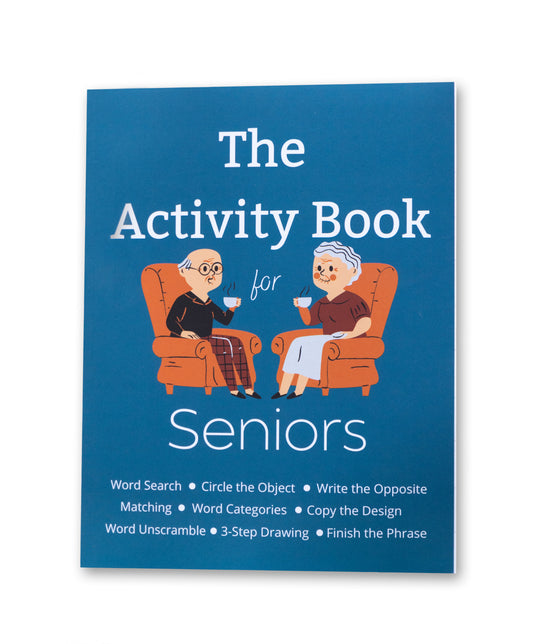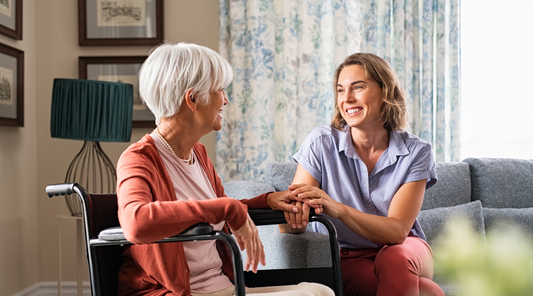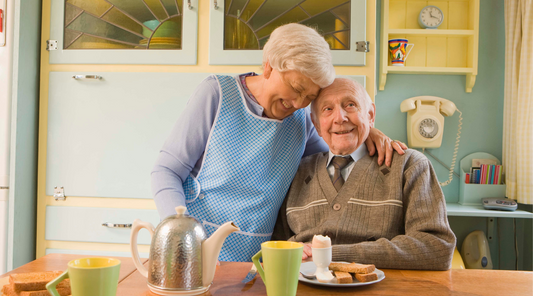
Making the Most of Visiting Your Loved One with Dementia
Share
Visiting a loved one with Alzheimer's or dementia can be filled with challenges and surprises. It's common to feel uncertain about how to navigate their memory loss. However, despite the chaos, your visits hold immense importance.
Let me share a personal story from my journey with my mom, who has been battling with dementia for 19 years and now finds herself in its advanced stages. Despite her communication struggles, there are moments when she breaks through the fog of confusion. For example, when preparing for my daughter’s wedding last year, I didn’t visit my mom for two days. I honestly thought she would not remember whether I visited. When I returned to get her ready for the wedding, immediately she admonished me, “Lisa, where have you been?!” This was an unusual change from her typical inability to form a full sentence. These fleeting moments serve as gentle reminders of her awareness of my visits, highlighting the enduring power of human connection.
Your Visits Matter
In these subtle exchanges lies a truth: our presence goes beyond memory, offering continuity and comfort to our loved ones. So, as we journey together, let's hold onto these glimpses of clarity, finding solace in the simple act of showing up and being present, even when words fail us.
As individuals age and face mental and physical challenges, their social circles often shrink, making it harder to maintain connections. Limitations on driving, memory impairments, and a diminishing circle of friends compound the challenge. Social withdrawal during dementia exacerbates the difficulty in connecting.

Visits from loved ones, whether friends, family members, or hired caregivers, have a significant influence on enhancing brain function. Studies have consistently demonstrated that social interactions play a crucial role in alleviating feelings of isolation and loneliness, contributing to a slowdown in cognitive decline. Additionally, fostering social connections also serves to reduce stress and anxiety.
Recently, I arranged visits between my mom and two old friends she hadn't seen in decades. Although her conversations were brief during these visits, her subtle Parkinson’s smile, which had become rare, spoke volumes. I stayed by her side during these visits to ensure they went smoothly. What surprised me was what happened in the days following each visit. Not only did her appetite increase, but she also smiled and spoke more frequently. Additionally, when I mentioned the visits to her later on, she remarked, "She came to visit me!" Although it was a challenge to discern whether she recognized her friends during the visits, their presence clearly brought her joy, especially evident in the days following.
What Should I Talk About When Visiting Someone with Dementia?
Facilitating social connectivity in dementia requires a thoughtful approach. Engaging in activities such as talking and shared tasks can foster meaningful interactions. However, it's crucial to be mindful of the challenges faced by individuals with dementia, particularly concerning communication. Simple questions like "What did you do today?" may prove overwhelming due to memory limitations. Instead, opting for open-ended inquiries like "Have you had a good day so far?" can be more manageable and inviting since there is no wrong answer. Regardless of the response you receive, pay more attention to their tone than the actual content, especially if the answer doesn't make sense.
While verbal expression may diminish over time, individuals with dementia appreciate hearing about daily happenings, weather updates, or any shared experiences. During my mom’s visits with her two friends, the content of the conversations didn’t matter, their presence was what counted. As dementia progresses, focusing on immediate surroundings can serve as a springboard for communication. Commenting on the beauty and interesting aspects of a nearby plant or discussing the detailed beauty of a picture on the wall can provide meaningful points of engagement.

What Is There To Do Other Than Talk During a Visit?
Activities that alleviate conversational pressure can also enhance social interaction. These may include:
- Sharing a snack or meal
- Working on a simple puzzle,
- Taking a stroll (indoors or outside)
- Engaging in light exercise with a balloon, or
- Exploring adult coloring or activity books together
- Reading them a short story or article
- Looking through a photo album together
At GrandMinds, we're dedicated to providing meaningful activities for adults with memory deficits. Explore our products to facilitate engagement and connection.
Visiting your loved one is important for their overall well-being. Whether you're able to visit once a year, every month, weekly, or even daily, the profound impact of your presence and connection cannot be overstated. Each visit offers an invaluable opportunity to provide comfort, companionship, and support, essential aspects of their emotional and mental health. The act of showing up and spending time together fosters a sense of belonging, security, and love that contributes significantly to their quality of life.






